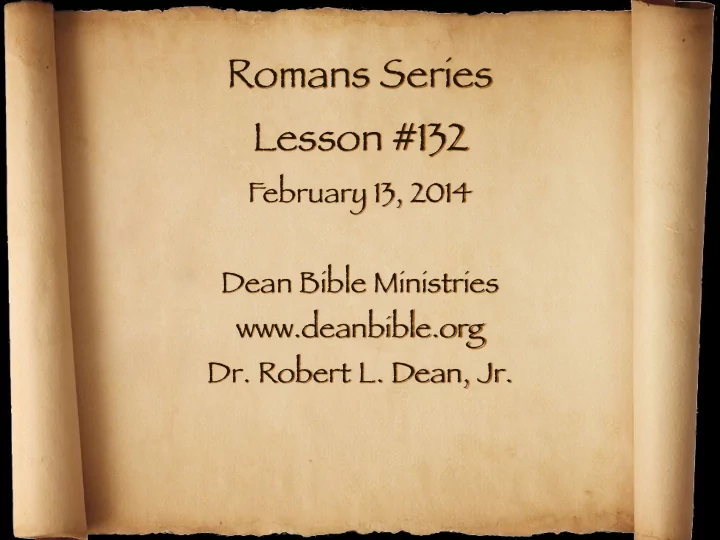

Romans Series Lesson #132 February 13, 2014 Dean Bible Ministries www.deanbible.org Dr. Robert L. Dean, Jr.
The Epistle to the ROMANS Spiritual Gift Introduction – Part 4 Permanent vs. Temporary Gifts Rom 12:3-4
The Doctrine of Spiritual Gifts: An Introduction
7. There are two categories of spiritual gifts: permanent gifts and temporary gifts.
Observations 1. Prophecy and knowledge are both abolished (v. 8), but tongues stops. 2. Prophecy and knowledge are both partial, but the gift of languages is not said to be partial. 3. Paul states that the partial prophecy and partial knowledge are abolished when the perfect ( τέλειος ) arrives, thus suggesting that the arrival of the τέλειος is not the cause of the cessation of the gift of languages. 4. Paul specifically uses καταργεω a final time in verse 11, “I put away childishness,” to make sure the reader realizes the connection between putting away childishness and putting away prophecy and knowledge.
1 Cor. 13:8, “Love never fails. But whether there are prophecies, they will fail; whether there are tongues, they will cease; whether there is knowledge, it will vanish away.” pi÷ptw piptoœ pres act indic 3 sing to fall, to fail
Seven Interpretations of the “Perfect” “Completion” “Perfection” Completed Canon Death, face to face with the Lord Mature Church Rapture Second Coming Eternal State Eschaton
Seven Interpretations of the “Perfect” If the “perfect” arrives when we enter an eternal state face to face with the Lord, then faith, hope, and love continue into that eternal state. But since hope and love are contrasted with “sight” (2 Cor. 5:7; Rom. 8:24) then neither extend into eternity; therefore the continuation of faith and hope is beyond the cessation of prophecy, tongues, and knowledge, but before the coming of the Lord at the end of the Church Age. Loves is all that continues beyond this age.
1 Cor. 13:12, “... Now I know in part, but then I shall know just as I also am known. a‡rti arti now as in right now, “now” in the apostolic era nuni÷, nuni; a broader now, “now” in the Church Age 1 Cor. 13:13, “But now abide faith, hope, love, these three; but the greatest of these is love.”
“Man” adult Child (partial) (complete) Now Then spoke (tongues) Characteristics thought (prophecy) of childhood understood (knowledge) “Perfect” removed abolished
“Man” adult Child (partial) (complete) Now Then spoke (tongues) Characteristics thought (prophecy) of childhood understood knowledge) “Perfect” removed abolished see reflection dimly See “face to (illustration of face” prophecy)
“Man” adult Child (partial) (complete) Now Then spoke (tongues) Characteristics thought (prophecy) of childhood understood (knowledge) “Perfect” removed abolished see reflection dimly See “face to (illustration of prophecy) face” Know in part Know fully
Canon Post-Apostolic Period A.D. 95–? Now Then Now eternity arti nuni Pre-Canon faith, hope, love love Apostolic Period A.D. 33–95 Knowledge, Prophecy, and Tongues end
Conclusion 1. The “perfect” completes the two partial gifts which are revelatory. 2. Therefore the “perfect” must also be revelatory, i.e., the Canon. 3. The arrival of the “perfect” separates the immediate “now” from the future “then.” 4. This is illustrated by the child-adult or maturity statement of v. 11. 5. What distinguishes childhood of the church from maturity is a complete, sufficient revelation which enables the believer to face and handle the issues of life from a complete Canon of Scripture. 6. The completion of the Canon and the passing of the apostolic era transitions the church from a childhood stage to a maturity stage.
8. The purpose for the permanent spiritual gifts is mutual ministry and service in the body of Christ. **Spiritual gifts are not the means of spiritual growth or church growth.
9. It is not necessary to identify your spiritual gift in order to use it.
10. There is a distinction between natural talents and abilities and spiritual gifts.
11. Spiritual gifts have spiritual efficacy only when operating under the Filling of the Holy Spirit.
12. The body of Christ is like a team, with many different positions, each requiring different abilities. Some are more dramatic and overt, others operate behind the scenes.
13. The purpose for the spiritual gifts was to edify the body. Though a person may receive edification as a by-product of the use of his or her gift, this is not the purpose. When this becomes the purpose, then the gift is being used in a carnal manner.
14. A person may have more than one gift, and a person may have different proportions of those gifts.
Recommend
More recommend